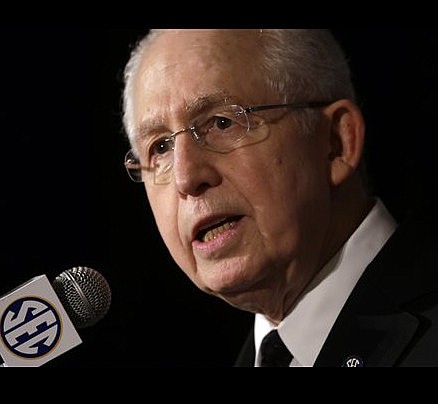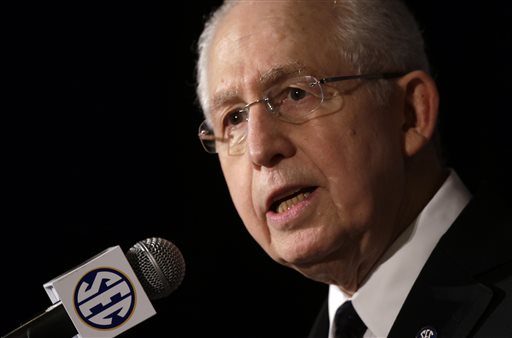Read moreSEC hoping NCAA flexibility can avoid 'crisis' stage
Hey, Mark Emmert. Still think you're in charge of the NCAA?
You may still officially be president, but Southeastern Conference commissioner Mike Slive clearly is running the show. And if you insist on clinging to some outdated business model that worries more about the have-nots than the dwindling haves, you may be scripting your own funeral, sad though that might be.
In case you missed it, Slive may have delivered the strongest statement yet about the future of big-time college football schools when he said of his conference's demands for more benefits for his student-athletes:
"I am somewhat optimistic it will pass, but if it doesn't, our league would certainly want to move to a Division IV. My colleagues, I can't speak for anybody else, but I'd be surprised if they didn't feel the same way."
Call it a threat, an ultimatum, saber rattling (unlikely), or a promise (highly likely), but flush with both the confidence and credibility that comes with handing out checks of more than $20 million to each of the SEC's 14 member schools at the conclusion of their annual spring meetings Friday, Slive also has another "C" word that Emmert lacks at the moment: Clout.
Love or hate the money machine that is the SEC, it rules the college athletic world at the moment, and its power is only going to grow once its new television network debuts in August.
Moreover, one need do little more than compare the University of Tennessee at Chattanooga's Finley Stadium to Tennessee's Neyland Stadium 120 miles up I-75 in Knoxville to appreciate fully the gap that currently separates the NCAA's FCS division (UTC) from its FBS counterparts. More important, that gap is almost as dramatic when comparing Middle Tennessee's Floyd Stadium (capacity of 30,788) with Neyland (capacity of 102,455).
This isn't a case of "You say tuh-MAY-toe and I say tuh-MAH-toe." This is a case of it's time to call this whole equality charade off, admit that the SEC, Atlantic Coast Conference, Big 12, Big Ten and Pac-12 already are some form of semi-pro enterprise and come to grips with the fact that the little guys need them far more than the other way around.
And let's quit kidding ourselves that they'll remain under the long arm of the NCAA law enforcement everywhere except football in order to protect the NCAA's chief source of revenue: the Division I men's basketball tournament.
Won't happen. Can't happen. Even if all these court cases wind up protecting the NCAA's antiquated view of amateurism, it's folly to believe that men's basketball players are going to live under one set of rules while the football team is held to a less draconian standard.
Both make money. On some campuses -- Kentucky, Duke, Indiana and Kansas, to name only four -- the hoops guys are far more successful. One size has never fit all, and now that Slive and his well-heeled counterparts believe they have the momentum to change rules concerning cost of attendance, long-term medical coverage and more substantial funding for former athletes to return to school years later and earn degrees, they're going to steamroll the little guys one way or another.
So what should the UTCs, MTSUs, UABs and Georgia States of the world do? First, acquiesce to most of what Slive and the rest of the Big Five conferences want as long as three demands are met:
1) All athletes must remain full-time students in good standing during the semester of their sport as long as they're under the NCAA umbrella.
2) As long as football is playing 12 regular-season games, two must be against non-Big Five opponents, and preferably one against a current FCS program within 250 miles of campus. To eliminate concerns about formulas to pick the four playoff teams, only 11 games count. The 12th is there to help the current FCS schools be guaranteed a "guarantee game."
3) Pell Grant money can't be used for tattoos, serious jewelry or fancy hubcaps. Pell Grants are federal money, which means they're our money. They were intended for needs -- books, tuition, food, clothing, essentials -- not such wants as liberal inking from your neck to your toes. If an athlete wants to send the money home to mom to help pay an electric bill, great. But jewelry, tattoos and 16-G cell phones are not needs.
As Slive addressed the media on Friday he said, "We hope everyone realizes we are moving into a new era and this is the way to retain your collegiate model. It would be a disappointment, and in my view a mistake, not to adapt the model."
The mistakes were made years, if not decades, ago, when we somehow made the decision that a college diploma was no longer reward enough for four years of playing sports for that institution of higher learning.
And if bright men such as Slive really are concerned about the money needs of their athletes, let them work summer jobs. Cut back practices and games. Give them some introduction to the real world that 99 percent of them are going to live in instead of pro sports.
But before Emperor Emmert is left with no clothes, he needs to consider how swiftly his organization could turn to dust if the Big Five take their balls in all sports and form a new league. Though only a few folks will remember this, the NCAA basketball tourney was once second in importance and following to the NIT.
Let the big boys bolt and March Madness could be found on the Internet only, on ESPN5 or something.
"The whole intercollegiate model is at risk if we don't do something," said Florida president Bernie Machen, pointing to various lawsuits against the organization and the threat of a players' union. "The whole thing could go up in smoke if the lawsuits come down or with the unionization rule."
Machen then turned to a "C" word of his own to describe the current situation: "Crisis."
And it is. Especially when the "autonomy formula" Slive and his cohorts seek within their own Big Five to force rules changes means lessening the power of the have-nots within those conferences, dropping the necessary "yeas" from 65 percent to 60 percent.
But another "C" word just might save the day. Or at least the NCAA. Just change Slive's title from commissioner of the SEC to czar of college athletics. Because no one can make the zeros multiply on royalty checks like Mike Slive.
Contact Mark Wiedmer at mwiedmer@timesfreepress.com

